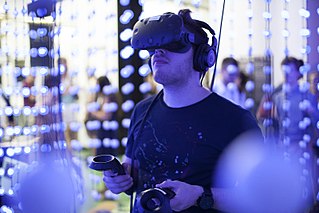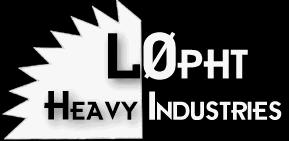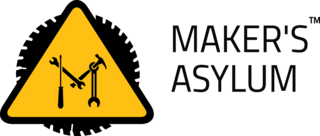 W
WA hackerspace is a community-operated, often "not for profit", workspace where people with common interests, such as computers, machining, technology, science, digital art, or electronic art, can meet, socialize, and collaborate. Hackerspaces are comparable to other community-operated spaces with similar aims and mechanisms such as Fab Lab, men's sheds, and commercial "for-profit" companies.
 W
WThe Amsterdam Subversive Center for Information Interchange (ASCII) was a squatted communication laboratory in the Dutch city of Amsterdam. The first incarnation was formed in 1999, based at Herengracht 243a. The lab then moved to the following locations: Jodenbreestraat 24, Kinkerstraat 92-94, Kostverlorenkade 2e, Wibautstraat 7 and Javastraat.
 W
WBaltimore Hackerspace is a hackerspace, sometimes called a makerspace, located in Baltimore, Maryland. Its creation has been inspired and modeled after the many other Hackerspaces around the United States and Europe.
 W
WBuilding BloQs is an open workshop in Enfield, London. A social enterprise, their emphasis is on creating and maintaining space and resources for people to make a living off their craft. The model is in response to rising rental prices and gentrification in London. In 2017, it had 300 professional members, a 10,000 square foot space, and was called a "proof of concept" for a new 55,000 square foot space. That new space will be part of a 200-acre, £6B urban development project called Meridian Water. The £2.7m project will make Building BloQs the biggest Open Workshop in Europe.
 W
Wc-base e.V. is a non-profit association located in Berlin, Germany. Its purpose is to increase knowledge and skills pertaining to computer software, hardware and data networks. The association is engaged in numerous related activities. For example, the society has had stands at large festivals, such as Children's Day, where they introduce young people to topics like robotics and computer-aided design.
 W
WChaosdorf is a hackspace operated by non-profit association Chaos Computer Club Düsseldorf / Chaosdorf e.V. in the city of Düsseldorf, Germany. It is Düsseldorf’s Chaos Computer Club chapter.
 W
WThe Chattanooga Public Library of Chattanooga, Tennessee, is a municipal public library overseen by the city government. As of 1928 it ran the Hamilton County public library. In 2013 it opened a makerspace.
 W
WDouble Union is a San Francisco hacker/maker space. Double Union was founded by women in 2013 with the explicit goal of fostering a creative safe space. The organization’s mission is to be a community workshop where women and nonbinary people can work on projects in a comfortable, welcoming environment.
 W
WThe Eli Whitney Museum, in Hamden, Connecticut, is an experimental learning workshop for students, teachers, and families. The museum's main building is located on a portion of the Eli Whitney Gun Factory site, a gun factory erected by Eli Whitney in 1798. The museum focuses on teaching experiments that are the roots of design and invention, featuring hands-on building projects and exhibits on Whitney and A. C. Gilbert.
 W
WFürstenberg (Havel) station is a railway station in the municipality of Fürstenberg/Havel, located in the Oberhavel district in Brandenburg, Germany.
 W
WHacDC is a hackerspace in Washington, D.C., and a 501(c)(3) nonprofit. According to one member's description, "HacDC members improve the world by creatively rethinking technology. We break, build, and occasionally abuse technology in the pursuit of greater knowledge about how it works and re-purpose it to build new things." In March 2009, its activities were described by The Washington Post. In April 2011, its activities were also mentioned by FastCompany., and NPR's All Tech Considered.
 W
WHacker Dojo is a 16,600-square-foot (1,540 m2) community center and hackerspace that is based in Santa Clara, California. Predominantly an open working space for software projects, the Dojo hosts a range of events from technology classes to biology, computer hardware, and manufacturing and is open to all types of hackers.
 W
WHackerspace.gr ('hsgr') is a hackerspace in Athens, Greece, established in 2011. It operates as a cultural center, computer laboratory and meeting place. Hackerspace.gr promotes creative coding and hardware hacking through its variety of activities. According to its website: "Hackerspace.gr is a physical space dedicated to creative code and hardware hacking, in Athens".
 W
WHackerspaceSG is a 1,202-square-foot (111.7 m2) technology community center and hackerspace in Singapore. Predominantly an open working space for software projects, HackerspaceSG hosts a range of events from technology classes to biology, computer hardware, and manufacturing and is open to all types of hackers.
 W
WHackMiami is a formal organization of information security professionals who host the annual international hacker conference that takes place in Miami Beach, FL known as the 'HackMiami Conference.'
 W
WKitchen Budapest (KiBu) is an innovation lab based in Budapest, Hungary. It was founded in 2007 by a group of media artists, theoreticians and coders. It was sponsored by Magyar Telekom. Founding members include Adam Somlai-Fischer, Peter Halacsy, Robin Nagy, Attila Nemes, and Eszter Bircsák to instigate digital literacy and DIY techniques.
 W
WL0pht Heavy Industries was a hacker collective active between 1992 and 2000 and located in the Boston, Massachusetts area. The L0pht was one of the first viable hackerspaces in the US, and a pioneer of responsible disclosure. The group famously testified in front of Congress in 1998 on the topic of ‘Weak Computer Security in Government’.
 W
WA library makerspace, also named Hackerspace or Hacklab, is an area and/or service that offers library patrons an opportunity to create intellectual and physical materials using resources such as computers, 3-D printers, audio and video capture and editing tools, and traditional arts and crafts supplies. In the field of library science, makerspaces are classified as a type of library service offered by librarians to patrons.
 W
WLondon Hackspace is a non-profit hackerspace in London, UK, established in 2009. Originally located in Islington, it moved to Hoxton in July 2010, and later to Wembley. In 2012, it was the largest hackerspace in the United Kingdom by membership, with over 1000 paying members.
 W
WMaker's Asylum is a makerspace / hackerspace in Mumbai and New Delhi, inspired by Artisan's Asylum, Chaos Computer Club and other maker organizations. According to the Maker's Asylum's website, "Maker’s Asylum is a community makerspace with two locations, Mumbai and Delhi, India. For hardware entrepreneurs, it’s easy access to tools, technology and talent so they can prototype their ideas. For problem solvers, it’s a space to bump ideas with other like and unlike-minded folks who share your passion. For hobbyists, it’s a place to play. Don’t let those ideas die on the drawing board. Make it real."
 W
WThe Metalab is a hackerspace in Vienna's central first district. Founded in 2006, it is a meeting place of the Viennese tech community, hosting events from culture festivals to user groups. It has played a catalyst role in the global hackerspace movement and was the birthplace of several internet startup companies.
 W
WNYC Resistor is a restricted membership private club hackerspace with 25 members in New York, inspired by Chaos Computer Club and other hacker organizations. The New York Times describes it as "kind of frat house for modern-day mad scientists." Its own website describes itself as "NYC Resistor is a hacker collective with a shared space located in downtown Brooklyn. We meet regularly to share knowledge, hack on projects together, and build community."
 W
WOpen Shed was a hackerspace in Penzance, Cornwall. Founded in 2012 it provided space for people working in the tech community to meet and work, workshops for electronics and light engineering projects, bike kitchen, events space, and an informal café. Run as a social enterprise, many of its members were self-employed.
 W
WPower Racing Series is a non-profit power wheels racing competition. It's modeled after the racing series 24 Hours of LeMons however with child sized electric cars. The power racing series competitions are held at Maker Faire events across the USA.
 W
WPumping Station: One is a non-profit hackerspace/makerspace in Chicago, Illinois. It's modeled after similar organizations located in the United States and Europe. The facilities consists of approximately 11,000 square feet (1,000 m2) of shop, workspace, and lounge areas.
 W
WRaumZeitLabor is a hackerspace operated by non-profit association RaumZeitLabor e. V. in the city of Mannheim, Germany.
 W
WSteamHead is a non-profit organization whose stated goal is to "increase the presence of design in education". SteamHead claims inspiration from the Maker movement and S.T.E.A.M. education. Initiatives credited to SteamHead aim to help communities increase their capacity to "make". Activities are supported sponsors including the British Council, local charities, and schools. The organization supports local events including MakeFashion Edu and School Maker Faires.
 W
WTechShop was a chain of membership-based, open-access, do-it-yourself (DIY) workshops and fabrication studios. As of 2017 they had ten locations in the United States: three in California, one in Arizona, one in Arlington, Virginia, one in Michigan, one in Texas, one in Pittsburgh, Pennsylvania, one in St. Louis, Missouri, and one in Brooklyn, New York, as well as four international locations.
 W
WTurtlestitch is a free and open source platform for generating and sharing patterns for embroidery machines. Turtlestich is derived from educational programming languages such as Logo, Scratch and Snap!, using the same jigsaw style programming paradigm which offers simplicity suitable for novices but has powerful features, described as ‘low threshold, high ceiling’ by Seymour Papert. Its microworldr is a turtle representing the needle of a programmable embroidery machine. So Turtlestitch can be used for creating novel patterns for embroidery, combining the abstract logic of computing and the physical materiality of textiles. Its primary use is educational, as it offers a way of introducing programming to audiences with diverse interests. A growing gallery of open source embroidery designs enables community-based collaboration and shared learning. In 2017, Turtlestitch received the award for the best Open Educational Resource in the German-speaking countries.
 W
WThe Ubica buildings are two adjacent buildings standing at 24 and 26 Ganzenmarkt, in central Utrecht, the Netherlands. Number 24 is a rijksmonument. The first recorded mention of the buildings is from 1319. After centuries of residential use, the buildings were bought by the Ubica mattress company in 1913 and used until a devastating fire in 1989. The buildings were then squatted for 21 years, before being redeveloped into a hotel and café-restaurant in 2014.
 W
WVigyan Ashram is a center of Indian Institute of Education (IIE) Pune established by Dr. S. S. Kalbag in 1983. It's a modern version of the old Gurukula systems of 'simple living and high thinking'. Vigyan Ashram is located in the village Pabal, approx. 70 km (43 mi) from Pune. It is situated on Shirur Road, Rajgurunagar. Population of Pabal is 10,000. There are several small hamlets attached to Pabal, which make Pabal central market place. Pabal is drought-prone and is a truly representative Indian village. The idea of establishing Vigyan Ashram at Pabal is whatever they do at Ashram can be replicated in any part of the country.